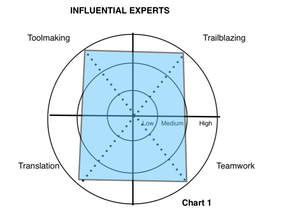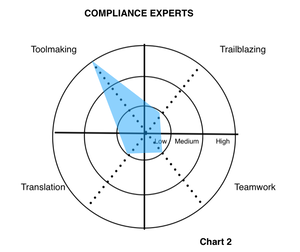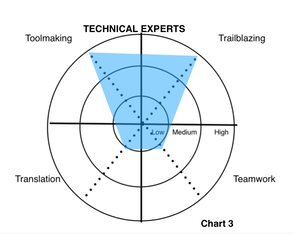Many Internal and External Experts feel that their skills are not appreciated enough by top managers and the Board. It’s really frustrating to have studied and mastered a discipline that should be critical, only to be ignored. I’ve heard this complaint from HR Managers, IT Managers, Accountants, Strategy Managers, Risk Managers and external consultants.
An interesting study reported in the Harvard Business Review, July-August 2013, shows why some Experts (Influential Experts) manage to be central to Top Management decision-making and others are dismissed as “just technicians” or “just required for compliance”.
The study shows that “Influential Experts” have strengths in four key competencies (as shown in Chart 1 below):
Trailblazing. The ability to find new uses for expertise. Individuals high in this competency cast a wide net in order to identify and frame issues that top management has not adequately addressed. They understand the business and the environment and how their expertise can add value to the business.
Toolmaking. The ability to develop and deploy tools that embody and spread expertise. Individuals high in this competency are able to develop tools that help chief executives analyse and interpret important issues. These tools include reports, budgets, scenario planning, business models, technical models and other thinking frameworks.
Teamwork. The ability to work with other managers to use their expertise and convince them of the relevance of their expertise. Individuals high in this competency are able to co-opt people into collaborating on the creation and improvement of tools, seeking out their feedback and incorporating it into the design.
Translation. The ability to personally help decision-makers understand complex content. Individuals high in this competency are able to explain complex issues simply, in a language and context that chief executives understand.
An interesting study reported in the Harvard Business Review, July-August 2013, shows why some Experts (Influential Experts) manage to be central to Top Management decision-making and others are dismissed as “just technicians” or “just required for compliance”.
The study shows that “Influential Experts” have strengths in four key competencies (as shown in Chart 1 below):
Trailblazing. The ability to find new uses for expertise. Individuals high in this competency cast a wide net in order to identify and frame issues that top management has not adequately addressed. They understand the business and the environment and how their expertise can add value to the business.
Toolmaking. The ability to develop and deploy tools that embody and spread expertise. Individuals high in this competency are able to develop tools that help chief executives analyse and interpret important issues. These tools include reports, budgets, scenario planning, business models, technical models and other thinking frameworks.
Teamwork. The ability to work with other managers to use their expertise and convince them of the relevance of their expertise. Individuals high in this competency are able to co-opt people into collaborating on the creation and improvement of tools, seeking out their feedback and incorporating it into the design.
Translation. The ability to personally help decision-makers understand complex content. Individuals high in this competency are able to explain complex issues simply, in a language and context that chief executives understand.
At the other end of the influential scale are “Compliance Experts” (see Chart 2). They are tolerated because of some legal or regulatory requirement but seldom listened to where it matters; because they are only skilled in building their tools. Think of the classic bean-counter.
Nearly as non-influential are “Technical Experts (see Chart 3). They know about toolmaking and even trailblazing but are dismissed because they lack the ability to translate their expertise and are unable to work with other managers. I once worked in a major bank where the Strategy Manager and Finance Manager (in charge of budgets) were competing for influence and worked almost independently of each other. As a result, when the budgets were completed, they had no relationship to the strategies the organisation had agreed to.
“Business Partners” (see Chart 4) have more (but still limited) influence; because their influence depends on the managers personal involvement with senior executives. I saw this happen in the bank where sometimes bankers with no expertise in the discipline where promoted into functional roles such as HR or IT but did not have the technical skills to succeed. The wise ones relied more on the experts on their staff, and gave them more freedom and exposure than the others.
Bruce Holland
Bruce Holland





 RSS Feed
RSS Feed